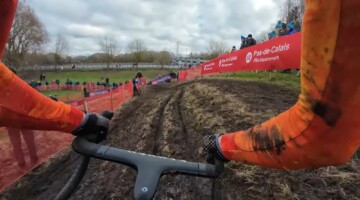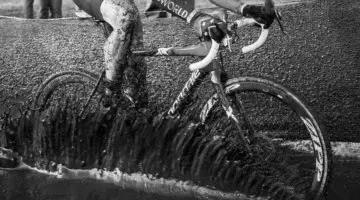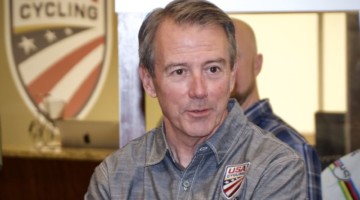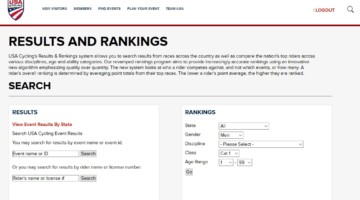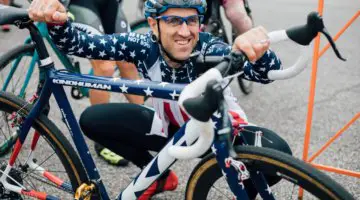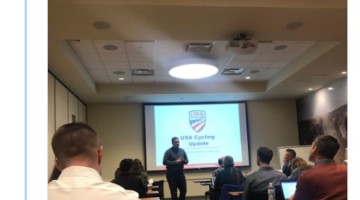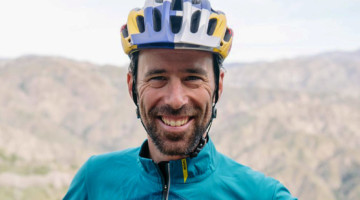Voting for USA Cycling’s Cyclocross Sport Committees is currently open through August 15. USAC license holders are eligible to vote for candidates depending on which type of license they hold. Cyclocross Magazine reached out to each of the candidates and offered them the opportunity to fill out a candidate questionnaire to give our readers a better understanding of what they want to accomplish on the Cyclocross Committee.
Today, we start with the two candidates running for commissaire. In the coming days we will also hear from the at-large, coach and local association representative candidates.
Name: Phil Miller
Residence: Redmond, Washington
Years as a Commissaire: 35, UCI International Commissaire since 1997
Cyclocross Magazine: How did you start your career as a commissaire?
Phil Miller: I moved directly from a 14-year career on the bike to officiating. While I was in high school and college, I officiated high school and NCAA baseball and fast pitch softball – officiating represented a very natural progression for a retired rider who had a background in sports officiating. I’ve never looked back. With the exception of my family, I can think of nothing I love more.
CXM: Why are you running for the ‘Cross Sport Committee?
PM: I put my name forward for the Sport Committee for several reasons:
- I believe strongly in the role and contributions of officials at all levels of cycling to help ensure not only the safety and fairness or events, but also doing everything possible to help make each and every event a success for all the participants.
- Officials provide an experienced voice which continues a tradition of informed, engaged participation in the issues which shape our sport.
- Cyclocross is a sport which is still growing, and still evolving through many competing visions. The management of this growth and enthusiasm requires an understanding of the context of how competitive cycling is managed and how the interests of competition are protected while being balanced with the needs of athletes, promoters, and fans.
- Our cycling family prospers when the voices of all interests are respectfully heard, consensus is built and passion is molded into action. We know that the best races, at any level, are the ones where the interests of athletes, organizers, fans, officials and host communities are respected and in which honest, open collaboration is valued and exercised.
This is how I approach officiating, how I will participate as the Commissaire representative and what I see as the great value of our Sport Committees. There is incredible energy associated with cyclocross and I believe that this energy can generate a template for future growth over all of competitive cycling.
CXM: What makes you a strong candidate for this position?
PM: I have been very fortunate to see and participate in the sport from its infancy to where it is today, and pretty much from all angles, from Wednesday Night Worlds to UCI World Championships, from local series to World Cups – all with an amazing community of riders, promoters, fans and officials. I bring to my work as an official a broad background of past experience in cycling, as an advocate, former athlete, association president and as one who has worked within the public sector as an advocate for the sport both on public roads and on public properties. I have international experience, and I have also worked in the trenches on weekly series. I believe that I have a 360-degree perspective that brings people together to find common cause and purpose.
CXM: We have seen your bio, but what’s your vision for the sport?
PM: Both cyclocross and competitive cycling generally are constantly being challenged by the shifting desires of participants, sponsors and organizers, as well as by the realities of a competitive marketplace for the attention of fans, sponsors and athletes. Cyclocross is blessed with incredible energy and passion and is still inventing itself to better reflect that passion. The lessons that we learn in the “lab” of cyclocross can be applied more broadly to support the whole of cycling sport. I love traditional, hard core CX competition – we need that culture and passion without question – we also need to be open to events at multiple levels which respond to the changes in the athletic marketplace to meet the needs of contemporary athletics.
CXM: What are the most important issues USA Cycling needs to address right now?
PM: As mentioned above, USA Cycling is engaged in keeping cycling relevant and fresh in a rapidly changing marketplace. Doing so in an era of fiscal constraint is a huge challenge. Maintaining a customer-driven, yet member-based organization that is both responsive and responsible is a huge challenge. Some of these are not necessarily specific to CX – electronic communications, websites and IT generally hve been tough issues for a while now. For elite athletes, a different set of challenges exists – gender equity, calendar consistency and flow and maintaining a high level of technical expertise across the board at national events,
CXM: What changes would you like to help make as a member of the Cyclocross Committee?
PM: That the United States is considered a growth leader in cyclocross internationally is both a blessing and a burden. We have set and must maintain a commitment to values such as gender equity that make the American CX experience unique and vital. Keeping a strong grass roots element to the sport at the local level and maintaining a structure that encourages participation are areas that require constant development and openness to new ideas. There is no shortage of innovative thinkers in the US cyclocross community!
We need to build on the excellent work recently completed on the manual for protecting the environment at CX venues. Taking this information and making it operational – at all levels of the sport – is one of the best things we can do to maintain the growth in events and participation for which US CX has earned a great reputation.
CXM: What role do you see for the commissaire representative on the Cyclocross Committee?
PM: We know that the best races – at any level – are the ones where the interests of athletes, organizers, fans, officials and host communities are respected and in which honest, open collaboration is valued and exercised. This is how I approach officiating, how I will participate as the officials representative and what I see as the great value of our Sport Committees.
As a commissaire, I see my role on the Cyclocross Committee as to give voice to and work to promote key values:
- Maintain awareness of the needs of the sport from multiple perspectives, including local, national and international points of view – grassroots and professional – riders, promoters, fans, officials, and host communities.
- Continue developing a means for working with all who have a role in producing and administering cyclocross events, including those who host and deal with the physical impacts of events; • Focus our energy on that which is achievable in an era with limited resources.
- Strive to inspire others to participate and innovate in growing cyclocross specifically, and competitive cycling generally.
CXM: What are the successes and failures of USA Cycling’s current efforts to recruit and develop commissaires?
PM: The identification of new talent is a challenge for officiating across disciplines. Long ago, as in my case, when you reached a certain point in your racing career one would assume new roles supporting the sport – organizer, coach, official, etc. Now we become Masters, which is magnificent, but the talent pool gets thinned out.
USA Cycling has done a great job training officials for years, and it shows internationally. I’m very proud of being a part of that tradition. USAC is working hard to make improvements in that program, with a very welcome emphasis on “in-the-field” training. So beyond talent identification and training, providing a full and robust support system with training materials, equipment and administrative access remains very important.
One of the biggest steps forward, and a threshold for my stepping forward for the Sport Committee, is a newfound respect for officiating within USA Cycling. I am profoundly impressed with the change in culture brought forward by Derek Bouchard-Hall, Chuck Hodge and now with the tremendous hiring of Randall Shafer as Technical Director. This cultural change and respect is the single greatest factor I can identify in the effort to effectively recruit, retain, train and support officiating, and in so doing support safe, competitive and fair events throughout USA Cycling.
Click here for more information about voting and to see all the candidates.
Cover image: flickr user MoBikeFed


